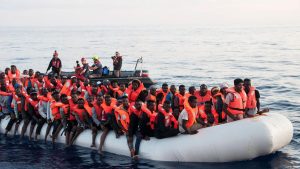If we had little data and nothing more than political discussions in western capitals to go by, it would seem as if the whole world was on the move and all were headed for rich countries. The transatlantic conversation is unblinkingly focused on migration.
Europe seems unable to consider anything else right now but Thursday’s major summit in Brussels on migration is expected to produce only minor ideas. After separating migrant parents from their children on America’s southern border, US President Donald Trump is now demanding uninvited arrivals be denied their right to due process. Italy’s far-right interior minister Matteo Salvini, whose linguistic style is similar to Mr Trump’s, stopped railing at unwanted migrants as “human flesh” long enough to visit Libya and unsuccessfully press the case for in-country migration reception centres.
Meanwhile, like a 21st century version of the shunned boat in Gabriel Garcia Marquez’s novel Love in the Time of Cholera, a migrant rescue ship called Lifeline sailed the Mediterranean for a week looking for a safe harbour. Marquez’s fictional boat carried a couple that wanted to hide from the world and used a yellow cholera flag to ensure they could never dock. Nowadays, migrants aboard a vessel carry the stigma of a yellow flag. Before Lifeline, another vessel with 630 mainly African migrants wandered from port to port until Spain relented.
Do the facts warrant such high drama, such an acute sense of the West under siege? The overwhelming majority — 85 per cent — of refugees are in developing countries, generally those adjacent to the places from which they fled. Turkey, Pakistan, Uganda, Jordan and Lebanon are among the world’s top 10 refugee hosts, according to the latest annual report by the UN Refugee Agency (UNHCR).
Even though the number of forcibly displaced people has grown every year since 2012 and set a new record of 68.5 million last year, the report says the majority never get to an international border. About 40 million displaced people never get to the point where they can leave their own country and certainly never make it to Europe or the US.
And two further statistics from the UNHCR: the number of people headed for Europe via the Mediterranean has dropped by more than 50 per cent this year, compared to the same period last year. New asylum applications worldwide also dropped 36 per cent between January and April this year from the same period last year.
Migration is not at a peak; hysteria is. It’s easy to dismiss this as a bigoted, self-satisfied, insular response to acute human need. But the issue is a great deal more nuanced.
First, it is wrong to conflate refugees with economic migrants, as is now increasingly happening, causing both groups to be equally disdained.
Second, it is right to recognise that while every refugee is originally an asylum seeker, not every asylum seeker achieves refugee status. There are 3.1m asylum seekers in the world today and 25.4m who have refugee status, one-fifth of whom are Palestinian.
Third, economic migrants sometimes falsely claim persecution and seek asylum in an attempt to cross restrictive borders. This sows doubt about legitimate asylum seekers. The 1951 UN Refugee Convention was always non-binding but is now increasingly ignored in countries where the distinction between asylum seeker and economic migrant is deliberately blurred.
Fourth, it is not a crime to seek asylum, nor is it illegal to want the chance to work outside the country of one’s birth. But both of these are not an inalienable right.
Clearly, the situation is a great deal less onerous for the rich world than it would seem from the high-pitched debate. That said, ever larger numbers of people will continue to be on the move for the foreseeable future. They will flee for the following, among others: intractable conflicts, such as in South Sudan; indefinite conscription as in Eritrea; gang violence and insecurity, as in El Salvador and Guatemala; acute lack of economic opportunity as in Tunisia.
Add demographic change to push factors such as violence and poor governance; exponential growth in Africa means it will have 2.4 billion people by 2050 — more than double today’s population, far outstripping the continent’s ability to educate, house and employ its citizens.
If there were ever a need to re-tool the world order, it is now, in terms of definitions, institutions and expectations.
Asylum, it is clear, will be a matter of individual arbitration by countries.
Economic migration is a more sensitive issue. However, most countries have changing needs for workers in different sectors. Temporary non-family work visas would be the best anti-poverty programme possible.
If there is to be a world order, it needs constant maintenance to accurately reflect the way we are now.


